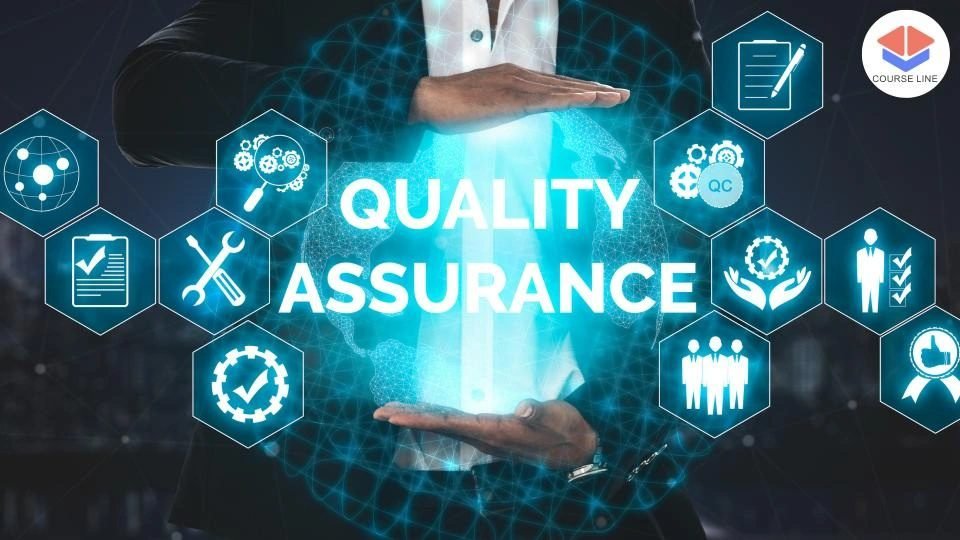Course Features
Price
Study Method
Online | Self-paced
Course Format
Reading Material - PDF, article
Duration
5 hours, 55 minutes
Qualification
No formal qualification
Certificate
At completion
Additional info
Coming soon
- Share
Overview
The Quality Engineering Level 3 Advanced Diploma offers a comprehensive introduction to the world of quality management, focusing on key principles, tools, and techniques used in the industry today. Students begin by gaining a solid foundation in quality engineering, exploring its history, evolution, and significance across various sectors. They will delve into the intricacies of Quality Management Systems (QMS), including the ISO 9001:2015 standards, quality policies, and documentation required to ensure high standards of quality.
The course includes an in-depth exploration of Statistical Process Control (SPC), a vital tool for monitoring and controlling quality in production processes. Students will also study Six Sigma methodology, including the DMAIC (Define, Measure, Analyze, Improve, Control) framework, and Lean Six Sigma practices, which are critical for process improvement. Further topics include Total Quality Management (TQM) principles, quality circles, and continuous improvement strategies. Emphasizing practical application, the course covers important tools such as the Fishbone Diagram, 5 Whys, Pareto Analysis, and Failure Modes and Effects Analysis (FMEA), all of which are crucial for identifying and resolving quality issues.
In addition to quality control techniques, students will learn about quality auditing and assurance, exploring both internal and external audits, audit reports, and corrective actions. The course also provides insight into the importance of quality in manufacturing and service industries, emphasizing the application of lean manufacturing principles, Kaizen, and customer feedback to improve service quality. By the end of the course, students will be equipped to perform quality assessments, implement improvement initiatives, and lead quality-focused projects in their careers.
Who is this course for?
The Quality Engineering Level 3 Advanced Diploma offers a comprehensive introduction to the world of quality management, focusing on key principles, tools, and techniques used in the industry today. Students begin by gaining a solid foundation in quality engineering, exploring its history, evolution, and significance across various sectors. They will delve into the intricacies of Quality Management Systems (QMS), including the ISO 9001:2015 standards, quality policies, and documentation required to ensure high standards of quality.
The course includes an in-depth exploration of Statistical Process Control (SPC), a vital tool for monitoring and controlling quality in production processes. Students will also study Six Sigma methodology, including the DMAIC (Define, Measure, Analyze, Improve, Control) framework, and Lean Six Sigma practices, which are critical for process improvement. Further topics include Total Quality Management (TQM) principles, quality circles, and continuous improvement strategies. Emphasizing practical application, the course covers important tools such as the Fishbone Diagram, 5 Whys, Pareto Analysis, and Failure Modes and Effects Analysis (FMEA), all of which are crucial for identifying and resolving quality issues.
In addition to quality control techniques, students will learn about quality auditing and assurance, exploring both internal and external audits, audit reports, and corrective actions. The course also provides insight into the importance of quality in manufacturing and service industries, emphasizing the application of lean manufacturing principles, Kaizen, and customer feedback to improve service quality. By the end of the course, students will be equipped to perform quality assessments, implement improvement initiatives, and lead quality-focused projects in their careers.
Requirements
The Quality Engineering Level 3 Advanced Diploma offers a comprehensive introduction to the world of quality management, focusing on key principles, tools, and techniques used in the industry today. Students begin by gaining a solid foundation in quality engineering, exploring its history, evolution, and significance across various sectors. They will delve into the intricacies of Quality Management Systems (QMS), including the ISO 9001:2015 standards, quality policies, and documentation required to ensure high standards of quality.
The course includes an in-depth exploration of Statistical Process Control (SPC), a vital tool for monitoring and controlling quality in production processes. Students will also study Six Sigma methodology, including the DMAIC (Define, Measure, Analyze, Improve, Control) framework, and Lean Six Sigma practices, which are critical for process improvement. Further topics include Total Quality Management (TQM) principles, quality circles, and continuous improvement strategies. Emphasizing practical application, the course covers important tools such as the Fishbone Diagram, 5 Whys, Pareto Analysis, and Failure Modes and Effects Analysis (FMEA), all of which are crucial for identifying and resolving quality issues.
In addition to quality control techniques, students will learn about quality auditing and assurance, exploring both internal and external audits, audit reports, and corrective actions. The course also provides insight into the importance of quality in manufacturing and service industries, emphasizing the application of lean manufacturing principles, Kaizen, and customer feedback to improve service quality. By the end of the course, students will be equipped to perform quality assessments, implement improvement initiatives, and lead quality-focused projects in their careers.
Career path
The Quality Engineering Level 3 Advanced Diploma offers a comprehensive introduction to the world of quality management, focusing on key principles, tools, and techniques used in the industry today. Students begin by gaining a solid foundation in quality engineering, exploring its history, evolution, and significance across various sectors. They will delve into the intricacies of Quality Management Systems (QMS), including the ISO 9001:2015 standards, quality policies, and documentation required to ensure high standards of quality.
The course includes an in-depth exploration of Statistical Process Control (SPC), a vital tool for monitoring and controlling quality in production processes. Students will also study Six Sigma methodology, including the DMAIC (Define, Measure, Analyze, Improve, Control) framework, and Lean Six Sigma practices, which are critical for process improvement. Further topics include Total Quality Management (TQM) principles, quality circles, and continuous improvement strategies. Emphasizing practical application, the course covers important tools such as the Fishbone Diagram, 5 Whys, Pareto Analysis, and Failure Modes and Effects Analysis (FMEA), all of which are crucial for identifying and resolving quality issues.
In addition to quality control techniques, students will learn about quality auditing and assurance, exploring both internal and external audits, audit reports, and corrective actions. The course also provides insight into the importance of quality in manufacturing and service industries, emphasizing the application of lean manufacturing principles, Kaizen, and customer feedback to improve service quality. By the end of the course, students will be equipped to perform quality assessments, implement improvement initiatives, and lead quality-focused projects in their careers.
-
- Overview of Quality Engineering 00:10:00
- Historical Perspective 00:10:00
- Importance of Quality in Industry 00:10:00
-
- ISO 9001:2015 Standards 00:10:00
- Quality Policies and Objectives 00:10:00
- Quality Documentation 00:10:00
- Basics of SPC 00:10:00
- Control Charts 00:10:00
- Process Capability Analysis 00:10:00
- Principles of TQM 00:10:00
- Quality Circles 00:10:00
- Continuous Improvement 00:10:00
- Pareto Analysis 00:10:00
- Scatter Diagrams 00:10:00
- Histograms 00:10:00
- Quality in Production Processes 00:10:00
- Lean Manufacturing 00:10:00
- Kaizen 00:10:00
- Exam of Quality Engineering Level 3 Advanced Diploma 00:50:00

No Reviews found for this course.
Is this certificate recognized?
Yes, our premium certificate and transcript are widely recognized and accepted by embassies worldwide, particularly by the UK embassy. This adds credibility to your qualification and enhances its value for professional and academic purposes.
I am a beginner. Is this course suitable for me?
Yes, this course is designed for learners of all levels, including beginners. The content is structured to provide step-by-step guidance, ensuring that even those with no prior experience can follow along and gain valuable knowledge.
I am a professional. Is this course suitable for me?
Yes, professionals will also benefit from this course. It covers advanced concepts, practical applications, and industry insights that can help enhance existing skills and knowledge. Whether you are looking to refine your expertise or expand your qualifications, this course provides valuable learning.
Does this course have an expiry date?
No, you have lifetime access to the course. Once enrolled, you can revisit the materials at any time as long as the course remains available. Additionally, we regularly update our content to ensure it stays relevant and up to date.
How do I claim my free certificate?
I trust you’re in good health. Your free certificate can be located in the Achievement section. The option to purchase a CPD certificate is available but entirely optional, and you may choose to skip it. Please be aware that it’s crucial to click the “Complete” button to ensure the certificate is generated, as this process is entirely automated.
Does this course have assessments and assignments?
Yes, the course includes both assessments and assignments. Your final marks will be determined by a combination of 20% from assignments and 80% from assessments. These evaluations are designed to test your understanding and ensure you have grasped the key concepts effectively.
Is this course accredited?
We are a recognized course provider with CPD, UKRLP, and AOHT membership. The logos of these accreditation bodies will be featured on your premium certificate and transcript, ensuring credibility and professional recognition.
Will I receive a certificate upon completion?
Yes, you will receive a free digital certificate automatically once you complete the course. If you would like a premium CPD-accredited certificate, either in digital or physical format, you can upgrade for a small fee.
Course Features
Price
Study Method
Online | Self-paced
Course Format
Reading Material - PDF, article
Duration
5 hours, 55 minutes
Qualification
No formal qualification
Certificate
At completion
Additional info
Coming soon
- Share
Adult Learning Level 5 Advanced Diploma
Course Line237£490.00Original price was: £490.00.£14.99Current price is: £14.99.Arboriculture Level 5 Advanced Diploma
Course Line243£490.00Original price was: £490.00.£14.99Current price is: £14.99.Psychology Diploma: Understanding and Managing Stress, Anxiety, and Panic Attacks
Course Line237£490.00Original price was: £490.00.£14.99Current price is: £14.99.





